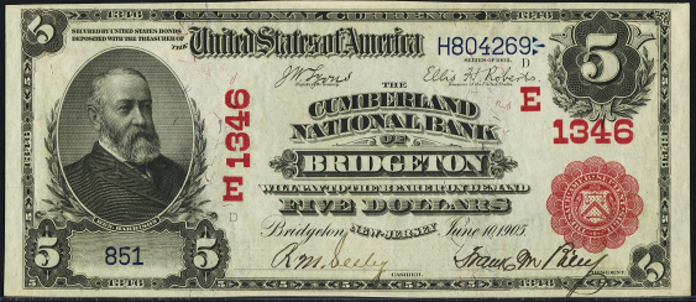Five Dollar Notes › Nationals › 1902 Five Dollar National Bank Notes › Pennsylvania Charters › 1902 $5 Hughesville Pennsylvania Grange National Bank Of Lycoming Co
Get Value Now
| Item | Info |
|---|---|
| Series | 1902 |
| Charter | #8924 Grange National Bank of Lycoming Co. of Hughesville, Pennsylvania |
| Year Chartered | 1907, 490 Banks Chartered |
| City Info | Hughesville is a borough in Lycoming County, Pennsylvania, United States. The population was 2,220 at the 2000 census. It is part of the Williamsport, Pennsylvania Metropolitan Statistical Area. Hughesville is named for Jeptha Hughes, who purchased land from John Heap in 1816 and laid out the town of "Hughesburg" before selling the entire plot to Daniel Harrold in 1820. The town grew slowly around a gristmill that was constructed by Jacob Clayton. A tavern was built in 1820, and a general store followed ten years later. The first doctor in Hughesville, John W. Peale, arrived in 1828. Hughesville was incorporated as a borough on April 23, 1852. The first dentist opened an office in 1853 and the first lawyer settled in Hughesville in 1875. Source: Wikipedia |
| Similar Cities | If your note doesn't match try: 1. Hughesville, Pennsylvania - First National Bank |
| Seal Varieties | Red, Blue |
| See Also | If your note doesn't match try: 1. 1907 $5 Legal Tender 2. 1899 $5 Silver Certificates |
| Other Info | 1. Value depends on notes known for charter, condition and market demand. |
| Neat Fact | Notes of Aldrich-Vreeland Period (1908-1915) contain inscription "Secured by United States bonds or other securities" (Friedbergs, 20th Ed. P 100) |
No Obligations Offers and Appraisals
Please submit a good photo or scan. It will be identified and evaluated. Understand there may be subtle differences between the image you see above and your note. Signatures, design, markings and note condition will determine the offer price. Notes in Uncirculated or better condition receive the best offers.
Appraisals can be estimated for wholesale and retail prices. Wholesale is what dealers typically pay. Retail is what a collector might pay. Retail is slightly higher in most cases.
Please visit this page for USA Paper Money Reference. Do not treat this page as a reference guide, it is for appraisal and acquisition purposes only.
